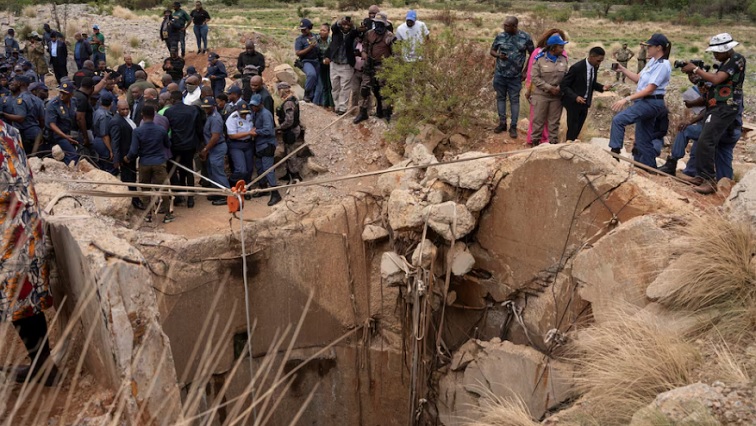The South African Federation of Trade Unions (Saftu) has sharply condemned the government for what it calls the tragic and preventable deaths of over 50 miners in Stilfontein, North West, whose bodies were recently recovered after a months-long standoff. The miners, who had been trapped underground for weeks, were only rescued following a state-backed operation that successfully brought 132 miners to the surface, but it was too late for many.
Saftu General Secretary Zwelinzima Vavi described the survivors, many of whom had endured extreme hardship without food or water, as “walking ghosts.” These miners, many undocumented and hailing from neighboring Southern African countries, were left to perish in what Vavi has labelled an appalling act of state negligence. “These workers, driven by desperation and poverty, were condemned to die in the depths of the mine,” Vavi said, highlighting the severity of the government’s failure to act sooner.
The tragedy has drawn comparisons to past instances of government indifference, most notably the Marikana massacre, where 34 striking miners were killed in 2012. Vavi decried what he sees as a pattern of government responses that dehumanize workers, pointing to the rhetoric used by the Minister in the Presidency, Khumbudzo Ntshavheni, who in November had suggested the government would not intervene to rescue the miners, instead opting to “smoke them out.” This statement, Vavi argues, reflects a wider disregard for human life and a consistent pattern of treating impoverished black workers as expendable.
“The government’s lack of urgency in this crisis is unconscionable,” Vavi continued. “To let these miners starve to death while denying them even the most basic chance of escape—this is state-sanctioned murder.” He criticized government officials, including Minister of Minerals and Energy Gwede Mantashe, for their cold response to the miners’ plight, accusing them of indifference and failure to visit the site until after the bodies began to pile up.
Saftu has also pointed out that the miners had no viable exit from the mine, as some government officials had claimed. According to Vavi, the only possible way out was through a community-operated structure involving ropes, a slow and laborious process that could take up to an hour per miner. While there was another potential exit through Shaft 10, it required 37 hours of crawling—an impossible task for miners already weakened by hunger and dehydration. These details, Saftu asserts, were known to the government but ignored as authorities allowed the situation to deteriorate.
The South African trade union movement has gone as far as calling this “the systematic killing of 59 workers,” with the death toll expected to rise as more bodies are recovered. Vavi condemned the “method of killing through starvation,” which he likened to the tactics used in genocidal conflicts. He noted the hypocrisy of the South African government, which frequently condemns the use of hunger as a weapon of war in international conflicts, while employing the same methods on its own soil.
In a statement following the incident, Police Minister Senzo Mchunu expressed regret over the deaths of the miners, attempting to clarify that the government had never been unwilling to assist. “We have never ever been unwilling to assist,” Mchunu said, defending the government’s actions despite earlier comments from Minister Ntshavheni suggesting otherwise. “Let us not go back to that ‘smoke them out’ statement. Let us focus on what is being said now, and what we are doing now.”
Despite these assurances, the tension between the government and Saftu is palpable. The trade union federation’s critique is rooted in the belief that the government’s failure to act swiftly not only cost the miners their lives but also represented a broader failure to uphold basic human rights—particularly the right to life enshrined in the South African Constitution.
With the bodies of the miners now being processed and identified, the situation has left the community and the country grappling with questions about the responsibility of the state in protecting vulnerable workers. As investigations into the tragedy continue, Saftu has called for accountability, urging the government to reflect on its treatment of miners and its approach to addressing the dire conditions faced by those living in poverty. The call for justice is growing louder, with trade unions, activists, and community members demanding an end to what they see as state-sponsored indifference to the lives of working-class South Africans.
The Stilfontein disaster has not only highlighted deep flaws in the government’s approach to illegal mining but has also brought to the forefront the need for a more compassionate and human-centered response to the country’s widespread poverty and inequality. As the investigation continues, all eyes remain on how the government will address the aftermath of this heartbreaking event.
